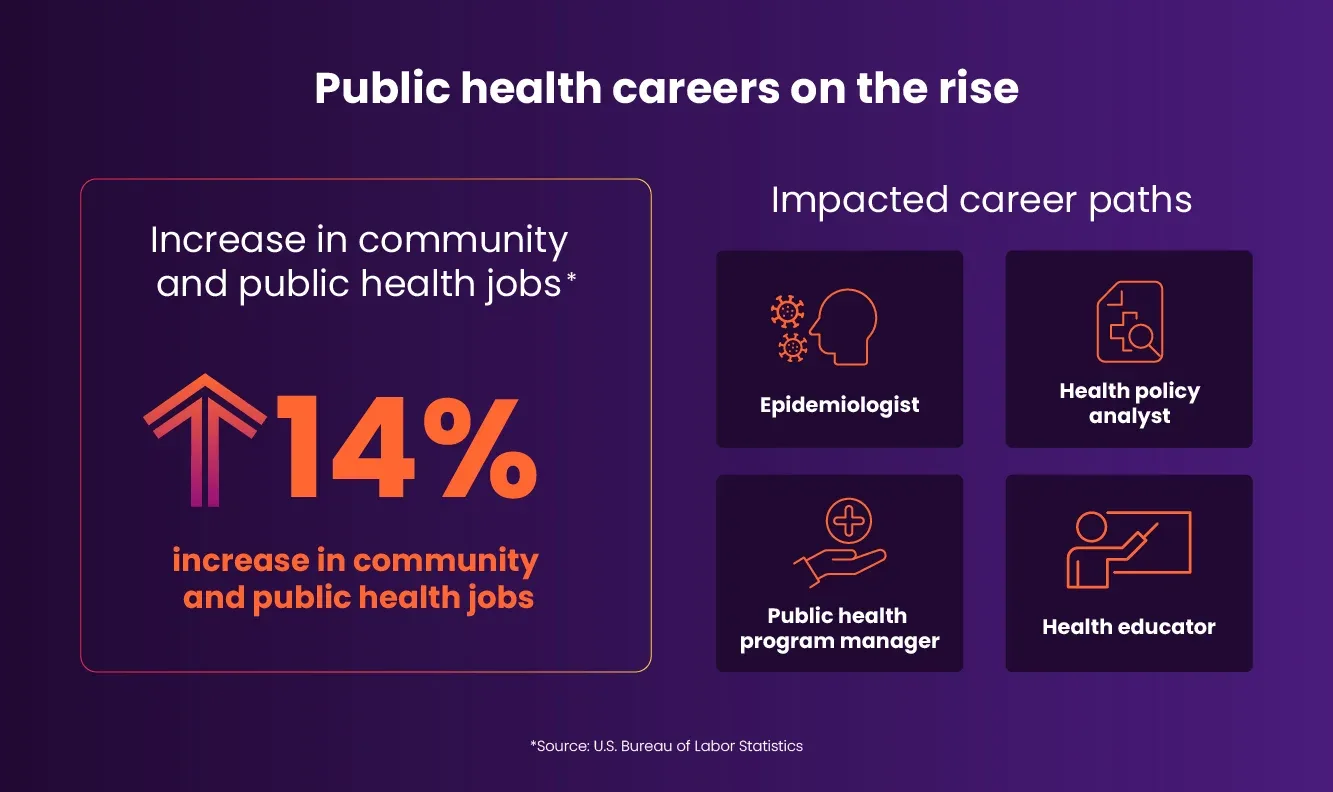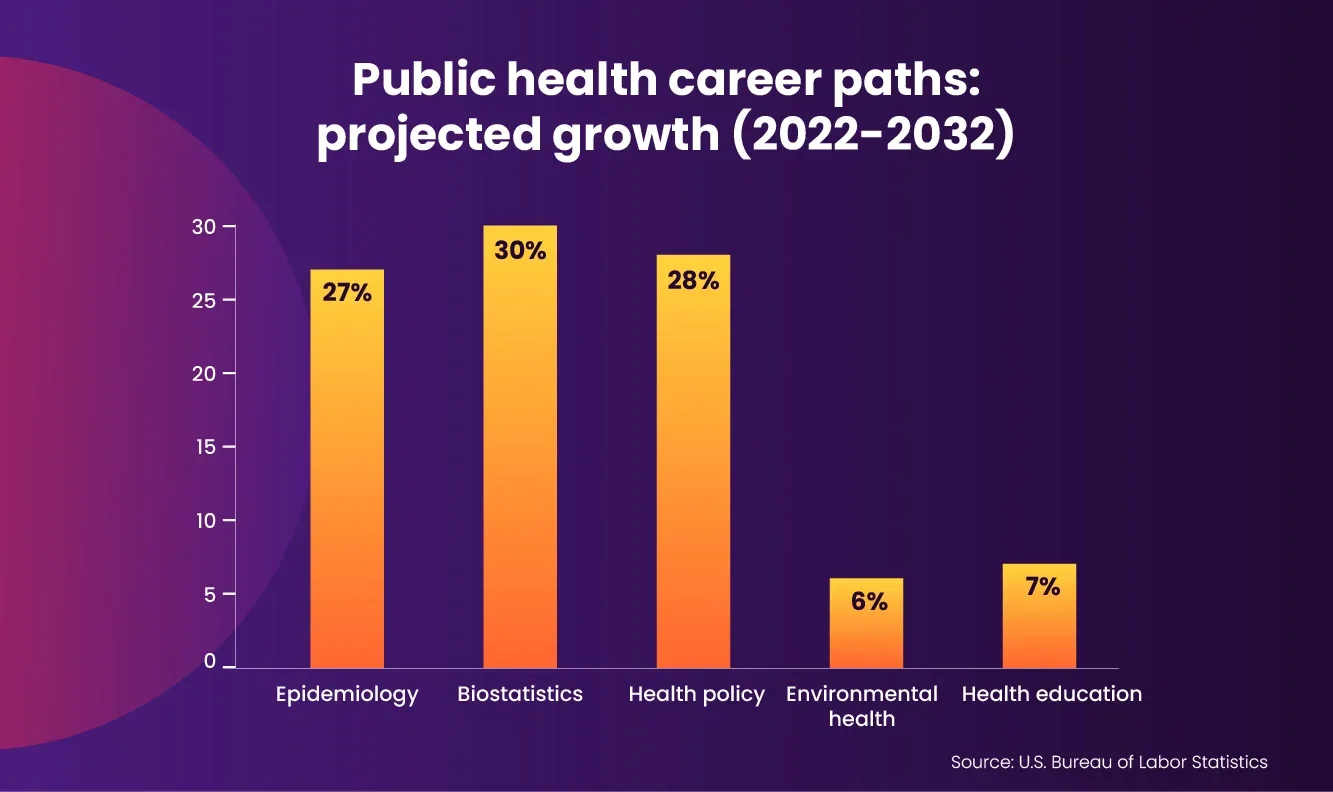Public health career progression
Explore key public health career paths, educational opportunities, and strategies to progress in the field.

How to advance your career in public health
As a public health professional, you have the opportunity to improve the lives and health of entire communities. And with a diverse range of roles to chose from, you can fuel the path you take to get there with your unique passions and interests.
So, what is your ideal career pathway in public health? Whether you’re a student just starting or a seasoned worker looking to advance your career, there are many ways to take the next step.

Five key public health career paths
There are countless opportunities to make a difference in the field. These include battling infectious diseases, designing health programs, and shaping policies that support healthier environments and expand equitable healthcare access.
This article will guide you through key considerations about key public health career paths to help you navigate your journey and unlock your full potential.
Epidemiology
Epidemiologists investigate disease outbreaks to mitigate their impact on public health.
- Responsibilities: Identifying origins, traits, and risk factors of diseases to develop strategies that prevent spread
- Projected Outlook: 27% growth from 2022-2032 according to the U.S. Bureau of Labor Statistics (BLS)
- Education Recommendations: Master's degree in public health with an epidemiology focus
- Skills: Strength in research, analysis, collaboration, communication, and organization
- Career Progression: Career path includes research assistant to epidemiologist, principal investigator, or leadership roles
Biostatistics
Biostatisticians provide data-driven insights that inform various public health decisions.
- Responsibilities: Designing studies, collecting data, and translating results into reports to advise public health programs
- Projected Outlook: 30% growth from 2022 to 2032 according to the BLS
- Education Recommendations: Master’s degree in public health (with statistical focus) or biostatistics
- Skills: Strong technical skills, including math, study design, data analysis, and statistical software
- Career Progression: Career path includes statistical analyst to senior biostatistician, lead statistician, or leadership roles
Health policy
Health policy professionals evaluate and develop policies to improve community health.
- Responsibilities: Analyzing health systems to advocate for policies that will enhance healthcare quality and access
- Projected Outlook: 28% growth from 2022-2032 according to the BLS
- Education Recommendations: Master’s degree in public health with a policy focus
- Skills: Strength in research and analysis, plus interpersonal skills, including communication, advocacy, and negotiation
- Career Progression: Career path includes policy coordinator to analyst, senior analyst, or management roles
Environmental health
Environmental health professionals study how environmental factors impact humans.
- Responsibilities: Conducting environmental assessments to develop regulations that minimize health impacts
- Projected Outlook: 6% growth from 2022 to 2032 according to the BLS
- Education Recommendations: Bachelor’s degree in public health or environmental science
- Skills: Knowledge of environmental regulations, hazard control and emergency response, research and analysis skills, and problem-solving
- Career Progression: Career path includes environmental health specialist to environmental health scientist and management roles
Health education
Health educators work with the public to encourage healthy behaviors and communicate protocols.
- Responsibilities: Developing, implementing, and promoting public health programs
- Projected Outlook: 7% growth from 2022 to 2032 according to the BLS
- Education Recommendations: Bachelor’s degree in public health or health education
- Skills: Strength in program planning, curriculum development, public relations, public speaking, cultural awareness, and organization
- Career Progression: Career path includes program coordinator or health educator to senior educator, program manager, or other leadership roles

Advancing your public health career
Public health careers offer exciting advancement opportunities, no matter which key discipline you choose.
Across specializations, entry-level positions can unlock opportunities to step into senior roles with advanced responsibilities, or management or directorial positions where you can use your expertise to lead a team or department.
The key public health career paths often intertwine and require similar skill sets, making it easy for public health professionals to step into different roles as their interests and skills evolve.
For example, a health policy analyst who is passionate about community activism might become a health educator, while an epidemiologist with a knack for statistical data could easily transition to a biostatistician role.

Educational opportunities for career expansion
When it’s time to advance your public health career, continued education is an excellent way to gain credentials that higher-level positions often require.
You typically need a master’s degree for most advanced positions, while some might require a doctoral degree. Many universities offer online programs that provide flexibility to working professionals who need to expand their public health skills while balancing a busy schedule.

Experiences for career advancement
In addition to education and field experience, professional development provides a solid foundation for career progression in public health.
If you're a student just starting out, internships offer hands-on experience where you can explore specialties that most interest you. For working professionals, attending conferences or workshops can help you make professional connections that might result in future career opportunities.

Choosing the right public health career path
Public health careers are ripe with opportunity, from epidemiology, biostatistics, and environmental health to health policy and education. Choosing and advancing your role in the field is an exciting journey where you get to use your skills and interests to positively impact your community's health.
Understanding the different responsibilities, educational needs, and skill sets that support different public health career paths can help you identify continued education and networking opportunities that will help you open doors and push your career in the right direction.
As you make professional development decisions, comparing your unique passions, strengths, and goals to the offerings of each discipline can go a long way in ensuring a successful and satisfying career.
Investing in your growth can open new possibilities and advanced job opportunities. Exploring online public health degree programs is a great way to get started. Connect with our enrollment advisors for personalized guidance on your career journey.